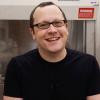John Castorino received his B.S. in biology from Ursinus College and his Ph.D. in cell and developmental biology from Thomas Jefferson University.
His current research focus is examining the intracellular trafficking of the cancer-related protein CD147 and a family of monocarboxylate transporters. Due to the excellent work of his students, a new trafficking partner of CD147 has recently been identified. His other research interests include messenger RNA stability, microRNAs, and other gene expression regulation mechanisms.
Castorino has advised students on a wide array of projects such as generating neurons in tissue culture from stem cells, making stem cells from somatic cells, cricket epigenetics, and biological animation. Outside of the laboratory, his interests lie in electronics, art, and zymurgy.


